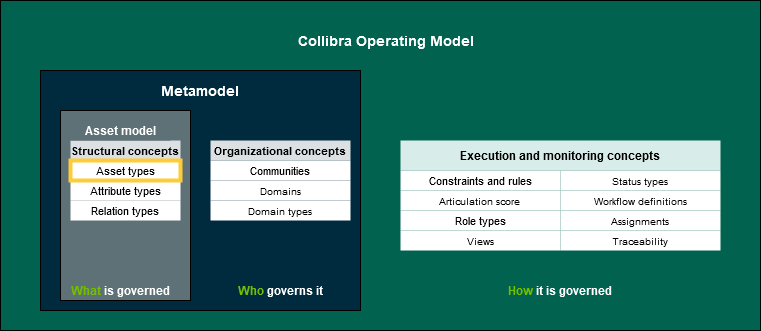Customizing asset types best practices
Recommendation
Collibra Data Intelligence Platform offers you the flexibility to create new asset types and redefine relationship behaviors to suit your organization's needs. This is particularly helpful when the existing out-of-the-box (OOTB) model does not meet you requirements. However, existing OOTB options should first be carefully evaluated before creating any new, custom asset types.
Impact
- Enhances your ability to leverage both existing and future Collibra products and capabilities as many of the most powerful features depend on OOTB components.
- Allows you to leverage Collibra resources more easily, as renaming existing assets can lead to ambiguity and disconnection from the documentation, user guides and education materials.
Best practice recommendations
Carefully consider the following guiding principles when making the decision on how to best utilize your assets:
- Business asset types: Renaming or creating new asset types which match your organization's vocabulary can enhance adoption across your organization.
- Data asset types: Retain the OOTB asset types and names.
- OOTB asset types: Try not to change the behavior of OOTB asset types, as both present and future product capabilities depend on them. You can add characteristics and relations to OOTB asset types, but be cautious about changing their basic behavior.
- Custom asset types: Create custom asset types only when OOTB asset types do not meet your organization's unique concepts and needs.
Topic area
Asset Types

Monitoring this practice
For customers with established production models:
- Run the Operating Model Reverse Engineering, or OMRE, on a regular basis to identify the elements in this article.
- Contact your Collibra representative to run the Operating Model Diagnostic.
Additional information
For more information, go to Assignments in Collibra's Documentation Center.
- Asset Types
- Overview of packaged asset types